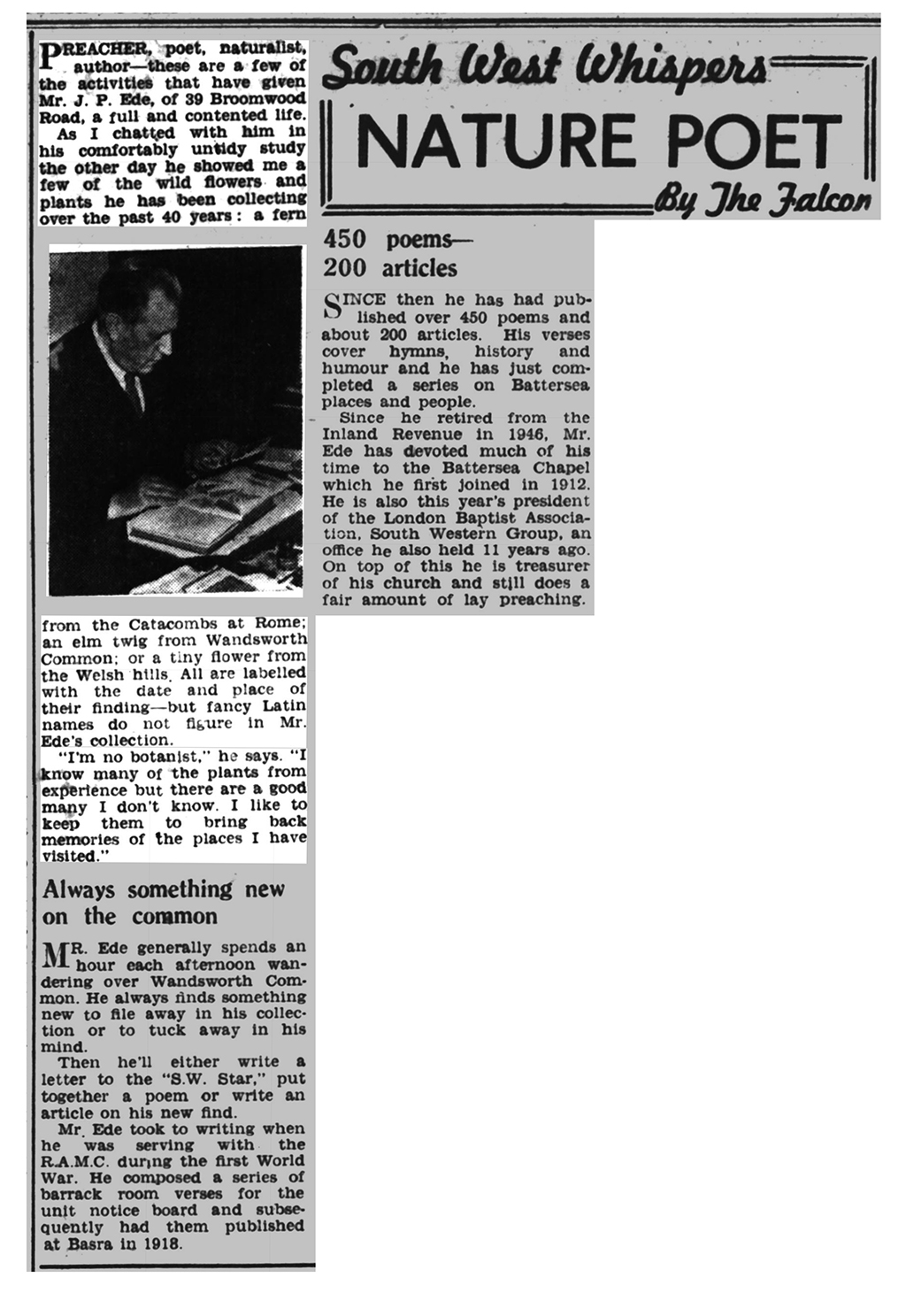

So who was J.P. Ede?
Here is an article that appeared in the South Western Star some months into his sequence of letters:
"PREACHER, poet, naturalist, author — these are a few of the activities that have given Mr. J.P. Ede of 39 Broomwood Road, a full and contented life . . .

South West Whispers
NATURE POET
By The Falcon
PREACHER, poet, naturalist, author — these are a few of the activities that have given Mr. J.P. Ede of 39 Broomwood Road, a full and contented life.
As I chatted with him in his comfortably untidy study the other day he showed me a few of the wild flowers and plants he has been collecting over the past 40 years: a fern from the Catacombs at Rome; an elm twig from Wandsworth Common; or a tiny flower from the Welsh hills All are labelled with the date and place of their finding—but fancy Latin names do not feature in Mr. Ede's collection.
"I'm no botanist," he says. "I know many of the plants from experience but there are a good many I don't know. I like to keep them to bring back memories of the places I have visited."
Always something new on the common!
Mr. Ede generally spends an hour each afternoon wandering over Wandsworth Common. He always finds something new to file away in his collection or to tuck away in his mind. Then he'll either write a letter to the "S.W. Star," put together a poem or write an article on his new find.
Mr Ede took to writing when he was serving with the R.A.M.C. [Royal Army Medical Corps] during the first World War. He composed a series of barrack room verses for the unit notice board and subsequently had them published at Basra in 1918.
450 poems — 200 articles
SINCE then he has had published over 450 poems and about 200 articles. His verses cover hymns, history and humour and he has just completed a series on Battersea places and people.
Since he retired from the Inland Revenue in 1948, Mr. Ede has devoted much of his time to the Battersea Chapel which he first joined in 1912. He is also this year's president of the London Baptist Association, South Western Group, an office he also held 11 years ago. On top of this he is treasurer of his church and still does a fair amount of lay preaching.
[BNA: Link]
Anything else?
I have only scratched the surface of his life — please add to it, if you can.
If you have access to the Ancestry website, I've started to build a family tree:
— Ancestry: John Philip Ede (1886-1961)
John Philip Ede was was born in 1886 — like his parents John and Alice Ede (nee Taylor), near Dorking in Surrey.
I'm not sure exactly when he came to Battersea, but in 1911, aged 23, he is described as an "Assistant Clerk (Abstractor) G.P.O." [General Post Office] lodging at 104 Battersea High Street. He married Ellen Ethel Smith in Battersea in September 1914, at the start of the First World War.
He joined the Royal Army Medical Corps in 1915 (when he and Ellen were living at 15 Hafar Road, Battersea) and served in several places in the Middle East and south Asia (including Secunderabad and Peshawar). He was not discharged until March 1920.
According to the Electoral Register, he was already living at 39 Broomwood Road by 1929.
In later life, he moved to Bedfordshire, where he died in 1961. His wife Ellen died in 1971.
I am intrigued by the line in the newspaper article (above):
"He has had published over 450 poems and about 200 articles. His verses cover hymns, history and humour and he has just completed a series on Battersea places and people."
I'd love to know more. (As yet, I've only found his "Wall Memorials of Battersea Chapel," Baptist Quarterly 10.4 (October 1940): 215-220.)
I have yet to read any of his poetry, so I have not idea whether it is "any good", but I note that he is included in a fairly recent anthology of war poetry edited by the illustrious historian of WWI Lyn Macdonald, Anthem for Doomed Youth: Poets of the Great War (2000).
According to the Folio Society's blurb, "This book compiles works by well-known WWI poets such as Owen, Sassoon, Rosenberg, Graves and Brooke, but it also includes poems by dozens of less well-known (or unknown) others as well."
A review lists J.P. Ede (along with Edward Thomas):
"Robert Sterling, John Freeman, C.J. Girling, Rupert Brooke, Richard Aldington, J.P. Ede, Edward Shanks, W.N. Hodgson, Harry L. Parker, ‘Quinapalus’, W.J. Turner, Charles Hamilton Sorley, Alfred Lichtenstein, Ewart Alan Mackintosh, Ernst Stadler, Wilfred Gibson, Julian Grenfell, Nowell Oxland, Ivor Morgan, Edward Thomas."
If you can add anything to this brief account of J.P. Ede's life and works (or would like to try), please let me know.
— March Chronicles 2024 Part One — J.P.Ede: Letters to the South Western Star, 1949 . . .
— J.P.Ede: Further letters to the South Western Star, 1950 . . .
— J.P. [John Philip] Ede: a biographical note.
— Back to the top of this page . . .
— March Chronicles 2024 Part Two [coming soon] . . .